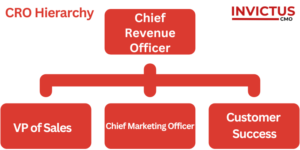
Chief Revenue Officer Salary
Now let’s get into the nitty gritty—you know, the personal stuff. In this article we’re going to learn all about the Chief Revenue Officer’s salary.
In the ever-evolving world of business leadership, the role of a Chief Revenue Officer (CRO) has emerged as a major in-demand need for companies seeking to maximize and organize their revenue streams. As a busy CEO of a small to midsize company, we understand the challenges you face in navigating the complexities of revenue generation while executing your numerous responsibilities. That’s where a Fractional CRO comes into play, offering expertise and guidance without the commitment of a full-time hire. In this article we’re going to explore what a full-time hire looks like vs. the wages of a fractional CRO.
What is the compensation structure for a Chief Revenue Officer?
As you consider bringing a CRO on board, it’s a great thing to consider. One of the critical aspects to understand is the compensation structure, as it has some unusual nuances compared to other C-suite personnel. For starters, the chief revenue officer’s salary varies widely. For example, the Chief Revenue Officer salary in NYC will be drastically different than the Chief Revenue Officer salary in California. Then you have other factors to consider such as the stage of the business. The Chief Revenue Officer Salary in a startup business is going to have a different compensation package to go along with it than one in a more established business doing $50M in revenue. The entire compensation structure for a CRO isn’t just about the hefty salary fitting a sales professional of their caliber. There are bonuses tied to KPIs (key performance indicators), commissions on their own sales, and even equity or stock options in the business as well to consider.

How much equity should a CRO get?
How much equity should a Chief Revenue Officer get?
Figuring out how much equity a Chief Revenue Officer (CRO) should snag boils down to the cash flow situation of the company. It’s like a delicate dance between the money raised and the value they bring to the table. Sometimes, it’s a straightforward chunk of equity, while other times, it’s dished out in the form of tantalizing stock options.
Let’s clarify. Say you’re running a ship that’s hauling in anywhere between $50 million to $200 million in annual recurring revenue (ARR). In that ballpark, a CRO typically gets a slice of about 55% equity. Now, if you’re steering a smaller vessel, raking in around $3 million to $10 million, the equity portion tends to shrink a bit. And for those teeny-tiny companies that haven’t quite hit the jackpot in fundraising, they tend to be more generous with the stock goodies, offering anywhere from 0.1% to 4% to sweeten the deal for their CROs.
But here’s the kicker: equity isn’t just a side dish in a CRO’s compensation buffet; it’s the secret sauce. Balancing out the salary with a healthy dose of equity is like adding spice to a dish—it’s what keeps top talents interested and invested in the long game of your company’s success.
Now, let’s talk retention. Great CROs? They’re like unicorns—rare and magical. And if you’ve managed to snag one, you want to make sure they stick around for the long haul. That’s where equity comes in handy—it’s like giving them a piece of the pie, so they feel like they’re not just steering the ship but sailing alongside you on the journey to success.
And here’s a little insider tip: if you’re considering bringing in a fractional CRO to work their magic on your business, offering them a slice of the equity

A great CRO is like a unicorn
pie might just be the golden ticket. It’s a win-win—they get to lower their fees a bit, and you get their expertise and a vested partner in your company’s growth.
So, when it comes to divvying up the equity pie for your CRO, remember: it’s not just about the numbers; it’s about ensuring they’re as invested in your company’s success as you are. After all, isn’t that what business partnerships are all about?
What is the total compensation for a Chief Revenue Officer?
Alright, so let’s break down the Chief Revenue Officer compensation plan in total? Here’s the lowdown:

What’s the total compensation of a CRO
• Bonuses: Now, who doesn’t love a bonus? On average, a CRO’s bonus sits at about $10,800, making up around 5.14% of their salary. And get this—half the folks in the CRO club score themselves a bonus every year.
• Commissions: The commission structure is going to vary by what is being sold, but there’s typically commission available for the CRO if they do any of the selling of the product or service themselves.
• Equity: Ah, the cherry on top. CROs can snag anywhere from a tiny sliver, starting at 0.1%, all the way up to a hefty 55%. It’s like owning a piece of the company pie and depends on how well funded the company is.
Now, here’s the kicker: it’s not just about the numbers; it’s about the big picture. Understanding the whole compensation package is key, especially when you’re thinking about bringing on a fractional CRO. According to Forbes, companies that tap into fractional execs see their revenue shoot up by an average of 33%. So, when you’re weighing your options, keep that juicy ROI in mind.
What does a Chief Revenue Officer do?
Alright, let’s dive into what makes that Chief Revenue Officer (CRO) role so darn valuable. Picture this: your CRO isn’t just wearing one hat—they’ve got at least three on rotation. They’re like the conductor of your revenue orchestra, pulling the strings across sales, marketing, and customer success. Their gig? Driving revenue growth, fine-tuning sales processes, and nurturing those oh-so-important customer relationships. If it’s got anything to do with bringing in the dough, you bet your bottom dollar the CRO’s got it covered. (To read a Jane Doe case study of how a CRO turned a company around, click here.)
How to become a Chief Revenue Officer?

How to Become a CRO
Alright, let’s talk turkey about how to climb the ladder to become a Chief Revenue Officer (CRO). First off, it’s like any other career climb—you gotta start from the bottom and work your way up. Think of it as leveling up in a video game, except instead of battling dragons, you’re navigating the wild world of sales, marketing, business development and customer success.
1)Step one? Get schooled up. While there’s no magic degree that’ll guarantee you the CRO crown, having a solid educational background sure helps. Think business, marketing, or even psychology—anything that’ll give you the smarts to understand what makes people tick and wallets open. If a degree isn’t an option, then you’ve got to have a pedigree of a lot of time in the field of sales, along with a great deal of time in sales leadership. 7 years is the minimum that most employers would look for in a CRO. And just to be perfectly clear, never hire a fractional CMO to perform your CRO duties. If they don’t have sales experience, then they aren’t fluent in sales and your results will be abysmal.
2)Next up, rack up that experience. Roll up your sleeves and dive headfirst into the trenches of sales. Spend some time schmoozing clients, closing deals, and mastering the art of persuasion. It’s like building your XP points in the game—you gotta grind to level up.
3)Now, here’s where it gets interesting—networking. You know, rubbing elbows with the bigwigs in your industry, making connections, and maybe even sharing a few laughs over drinks. Remember, it’s not just what you know; it’s who you know. So, don’t be shy about putting yourself out there and building those relationships.
4) And finally, don’t forget to keep learning and adapting. The business world is like a rollercoaster—full of twists, turns, and the occasional loop-de-loop. Stay sharp, stay curious, and always be ready to pivot when the winds of change blow your way.
Oh, and here’s a little joke to lighten the mood: Why did the CRO go to the beach? To catch some waves…of revenue! Okay, maybe I should stick to writing articles instead of comedy routines. But hey, a little laughter never hurt anyone on the path to the CRO throne, right?
Who reports to a Chief Revenue Officer?

Who Reports to the CRO
Alright, let’s paint a clearer picture of who’s in the Chief Revenue Officer’s (CRO) crew and why understanding these relationships is vital for smooth sailing in the leadership team. It’s typically in the Chief Revenue Officer job description that they have three key leaders or departments that report to them.
So, imagine the CRO as the captain of the revenue ship, charting the course towards profitability. Who’s on deck? Well, besides the sales and marketing teams, you’ve also got the customer success team leader reporting directly to the CRO. They’re the ones ensuring that once you’ve reeled in those customers, you keep ’em happy and coming back for more.
Now, here’s the real secret sauce: grasping the dynamics between the CRO, sales, marketing, and customer success is essential for keeping the ship steady. It’s like having all the gears in a well-oiled machine working seamlessly together. When there’s synergy and cooperation among these teams, you’re not just hitting your revenue targets—you’re sailing past them with ease.
So, the CRO’s job isn’t just about calling the shots—it’s about fostering a culture of collaboration, where every team member feels valued and understands their role in the bigger picture. When you’ve got that kind of teamwork happening, there’s no limit to what you can achieve.
What degree do you need to be a Chief Revenue Officer?
Let’s dive deeper into what it takes to become a Chief Revenue Officer (CRO). While there’s no one-size-fits-all degree that’ll land you the CRO title, having a strong educational foundation definitely helps set the stage for success. But a degree isn’t 100 percent necessary. Though you can think of it as the launchpad for your career rocket.
Now, here’s the thing: a degree alone won’t cut it. Because there are some key instincts that you just can’t teach in a academic environment and these characteristics have a greater impact on the type of sales leader you’ll be. But you need hands-on experience in the trenches of sales, marketing, or business development to truly shine in this role. It’s like honing your skills in a real-world laboratory, learning the ins and outs of revenue generation firsthand.
But here’s the kicker: a lot of employers aren’t fixated on your alma mater or your GPA. Nope, what they’re really after is a proven track record of leadership, vision, and execution. They want to see that you’ve got the chops to steer the revenue ship in the right direction, come hell or high water.
So, if you’ve got the passion, the drive, and a knack for turning ideas into reality, you’re already halfway there. It’s all about showcasing your ability to lead, strategize, and deliver results that make a real impact on the bottom line. And hey, who knows? With the right mix of education, experience, and a dash of that special something, you might just find yourself at the helm as the next Chief Revenue Officer extraordinaire.
How much does a CRO make?

A full-time CRO makes 50-70% more than a fractional CRO
The compensation of a CRO varies based on factors such as industry, company size, and geographical location. We addressed it in detail above, but here we’ll compare it to what you can typically expect to pay a fractional CRO. Typically, these invaluable pros earn between $9,000 and $15,000 a month for their resources and expertise. So, keep that 33% average revenue growth in mind when considering what to pay a fractional CRO.
As you contemplate the role of a Chief Revenue Officer in your organization, it’s essential to weigh the compensation structure, responsibilities, and potential impact on your company’s bottom line. Whether you’re seeking guidance on hiring a Fractional CRO or considering a full-time appointment, we’re here to support you every step of the way.
Reclaim the revenue that you’re leaving on the table now! Schedule your CEO Flash Focus call today. It’s a preliminary focused and high-level 15-20-minute meeting with CEOs to highlight the main challenges. No selling. Just solutions.


